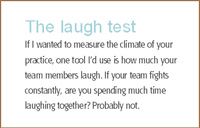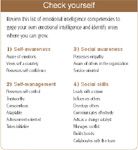What's your emotional intelligence?
Tantrums, crying, shouting-who can get any work done when your team is in a constant state of conflict? Emotional intelligence is your gateway to self-management. And when you manage yourself, you choose the path to a happier, more successful work life.
Have you ever worked in a practice where doctors or team members got so upset they threw things? When I ask this question at lectures, more than 50 percent of audience members raise their hand. In any other profession, this is called assault. In veterinary medicine, we call this a bad day.

The laugh test
But there's hope, and it's a tool called emotional intelligence. It's the key to understanding yourself, your doctors, and your team members. It helps you make the leap from surviving the workday to thriving and reaching new goals.
What is emotional intelligence? It's the ability to say the right thing at the right time in the right situation without coaching. It means you're able to express what you're thinking and feeling appropriately at all times.
First, understand others
When I first started working in the veterinary industry, I felt frustrated by how often people cried. When I approached team members to offer coaching or resolve a conflict, their responses were sometimes emotionally charged. I was shocked.

Check yourself
I reminded myself there were times in my own life where I wasn't able to have real, or what I call fierce, conversations. So I started thinking about what would attract people to a job where you work with sick animals, you clean up poo and pee, and people often don't communicate well. Who does that? Me, you say!
Here's the part that stinks: People with low self-esteem are sometimes attracted to these difficult environments. (Remember, I only talk about what I know, and I know a lot about this. I lived through, and I am living through, this.) So when I confronted team members with low self-esteem, they would experience what I call shame attacks. When I'd say, "Gosh, it would have been great if you could have been on time today," I'd get a little boy or little girl response. They didn't hear, "You were late, and I need you to be on time." They heard, "You're worthless."
I've been conducting research for my doctoral degree to uncover why some people in veterinary practices suffer from low self-esteem. I'm interviewing team members who've been in the profession longer than five years. So far, I've interviewed more than 100 team members, and many have shared histories that included traumatic events, including abuse and abandonment.

Take the test
My point: You work with many people in your practice with different backgrounds. When team members react negatively, consider the idea that sometimes their behavior has more to do with how they feel about themselves than what you've said. Now I'm not saying you should look around your practice and assume anyone who doesn't respond appropriately has low self-esteem. I'm just asking you to consider the people you're talking to may respond based on other events in their lives, and these reasons may include abuse, divorce, the loss of a child, a broken relationship, or many other causes. It's not your job to confront these people, but it may help you understand your co-workers' behavior a little better.
People with low self-esteem focus on surviving, not thriving. I know this because I've been through it. When I was 9 or 10, you would find me at school—anywhere—to get away from my house. I didn't want to hear things breaking and people yelling. With hard work and therapy, today I have no problem saying, "I'm worth more." Emotional intelligence offers us all a chance to move beyond survival and thrive.
Leaders set the tone
Great leaders motivate us. They move us to do more than we thought we could. We look to practice leaders to decide how to respond in many situations. When leaders drive people's emotions positively, we call this resonance. Negative leaders create dissonance.
We all know moods are contagious, but did you know that we literally talk to each other without words? If we sat in a room together and I felt sad, my sadness could be so overwhelming you would cry. If I felt happy, my happiness could be so overwhelming that you would laugh. Smiles are the most contagious emotional signals. It's pretty hard to look at someone's genuine smile and frown.
So we rely on connections with others for our emotional stability. You and the collective feelings of the group feed off one another. One bad apple can sour the whole group. So when a person behaves badly, everyone's behavior drops. You're only playing as well as the worst player on your team. And we often make horrific allowances for people with limited emotional intelligence skills.
Ultimately, happier teams are more productive. In Emotion Marketing (McGraw-Hill, 2000), the authors examine research that demonstrates for every 1 percent improvement in the service climate, there's a 2 percent increase in revenue. When team members' emotions are pushed toward the range of enthusiasm, their performance soars. When they're driven by rancor and anxiety, they falter. For example, research published in the book Naked Leadership (Longman, 2001) shows that mild, but prolonged, anxiety lasting more than three days can decrease productivity.
Now think about the situations and events that cause anxiety—not knowing your role, not knowing where the practice is going, not knowing what kind of feedback you'll get, not knowing information about the business. Some of you have been anxious for years. And with only 15 percent to 20 percent profit margins in a veterinary practice, can you really afford to cut off 2 percent of profits because you have a bad day at work? It literally pays to be in a good mood.
Moods are also the best predictor of work satisfaction. People who are happier are more satisfied with their jobs, and they're more likely to stick around. On the other hand, a recent Yale study shows 90 percent of workers who have negative feelings about their work have bad relationships with their bosses. Put simply, leaders who spread bad moods are bad for business.
Build your emotional intelligence
So how can you transform your practice culture? Whether you're a leader or a member of the team, the key is to develop your emotional intelligence. "Check Yourself" offers a complete list of competencies. These categories build on each other, so I recommend mastering the skills in the first column before moving on to the next group. Each of these four domains adds a set of crucial skills for resonant leadership.
The first step, self-awareness, should be the easiest to master. The definition of a functional adult is someone who knows what she thinks, what she feels, and how she affects the world around her. A person who isn't self-aware throws something across the room and then wonders why everyone else is so upset.
Emotionally intelligent people learn to manage themselves. They're not prone to outbursts, and they don't get caught up in the emotional drama of the group. When you're in control of your emotions, you're trustworthy. This means the people who work with or for you know you won't emotionally hijack them. If they come to you and say, "I made a mistake," you won't blow a fuse. You're going to say, "Ugh, that's a pretty big one, but we're going to work through it." Because when you create an empowered culture, people will make mistakes. And when you're a good self-manager, you also possess the chutzpa to admit when you've goofed up.
If you're socially aware, then you're service-oriented. The Bible and other books talk about people who possess the gift of hospitality or the gift of helps. This is a critical skill in veterinary practice. And if you're a leader, you need to practice empathy to be effective. I'm not talking about any "I'm OK, you're OK" mushiness. Being empathic means you make intelligent decisions that consider employees' feelings.
If you can do all of these things, you're ready to develop your social skills. This is where you become the visionary leader, the change catalyst, and the person who manages conflict effectively and builds bonds with others.
Once you and your co-workers master these skills, you'll notice a change in your work atmosphere. You'll be happier, more productive, and ready to work as a team to reach new heights.
Shawn G. McVey, MA, MSW, is a Firstline Editorial Advisory Board member and CEO of Innovative Veterinary Management Solutions. He's worked as a therapist, an aerobics instructor, a flight attendant, and a hospital administrator. Please send questions or comments to firstline@advanstar.com